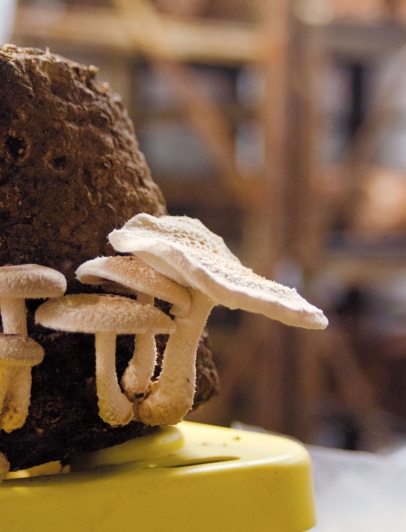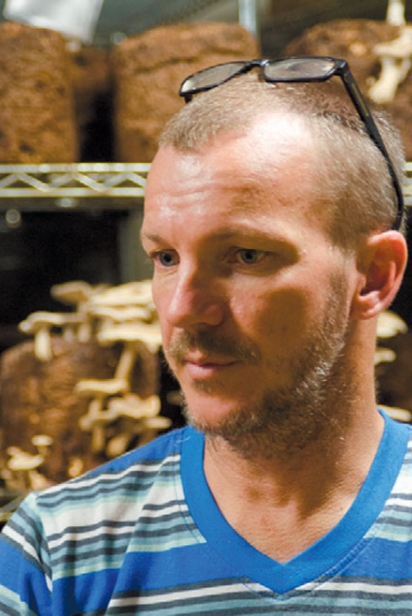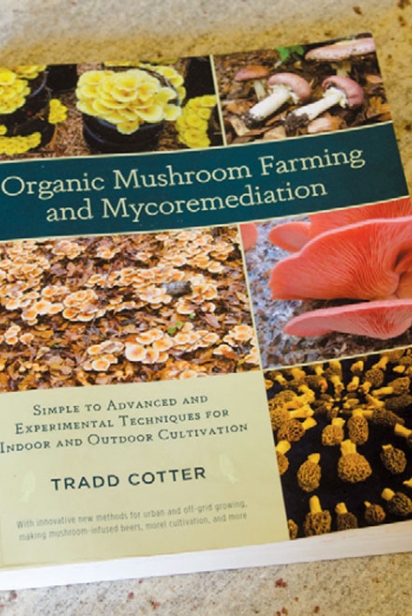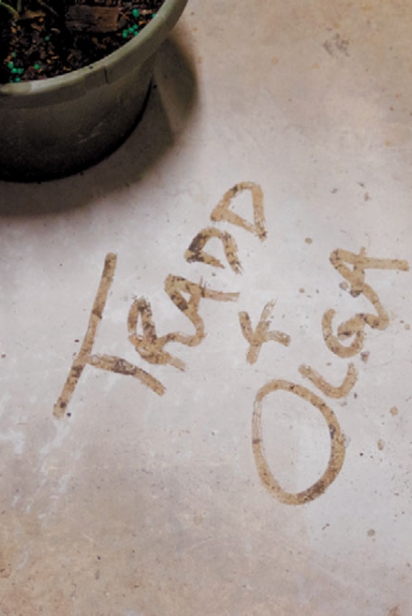The Scholar: Tradd Cotter on Mushroom Mountain
Notables
On Returning to Mushroom Mountain
For twenty years Tradd Cotter vacillated between wanting to write a book and being intimidated by the prospect. So much had already been done—and at times expertly so—regarding mushroom cultivation. After drafting a skeleton first manuscript, he thought, “It turned out like all the others on the market. It wasn’t special. It wasn’t fun.”
Then a few years ago on Christmas Eve, while visiting in-laws in Florida, Cotter decided to try again. His friends had told him about Chelsea Green, the publishing house that for 30 years has been a leader in supporting literature that focuses on the practicalities and politics of sustainable living.
“Everyone had gone to bed—all the presents were wrapped—and I stayed up submitting my proposal. My friends had said it might be six or eight weeks before hearing anything back, but within two weeks I got a response that went, ‘Hell yeah. Let’s do it.’ Like a Christmas gift to myself.”
Organic Mushroom Farming and Mycoremediation: Simple to Advanced and Experimental Techniques for Indoor and Outdoor Cultivation is a title whose ambition rivals that of a Fiona Apple album. The book itself, released in 2014, is so various and entertaining in its educational rewards, veering widely, and yet never feels disorganized or intimidating. “It’s a book about mushrooms, of course,” says Cotter, “but if you’re a goat farmer you can take something from it that’ll help you goat farm. Same if you plant vegetables. Most importantly, it will drive you from wanting to cultivate mushrooms to actually doing it.”
Organic Mushroom Farming has been a successful seller since publication and, most importantly, the author himself seems satisfied by the end result. “After finishing I thought, ‘I think I just wrote a book I’d like to read.’” But the road to release was not without high drama.
“The initial draft I sent they returned and basically said it was a mess. Then, midway through edits, I lost my thumb drive at a conference. That same weekend—I swear—my hard drive failed. So 30,000 words: gone.” About that time Cotter and his wife Olga discovered they were expecting their first child.
“So our daughter Heidi shows up January of 2014 as I’m finishing the book,” Cotter says.
“And it’s like two babies at once,” our photographer Brian says.
“Exactly.”
Cotter moved into a trailer on the property where he spent nights writing and parts of the day returning home to help with Heidi.
“I bet Olga loved that arrangement,” I say.
Tradd and Olga first welcomed me to their home—complex really—five years ago. I knew exactly nothing about mushroom foraging and was embarking on my first article for the second issue of edible Upcountry. What I loved about my time with the couple—and what I’ve grown to cherish in writing for the magazine—is both how much I learned in such a short time and also the generosity with which they educated. They utilized terminology I’d not heard before—free gills, connected gills, spore print processing, etc.—and I spent a large sum of the day crafting facial expressions I hoped indicated some semblance of understanding. By the time I left that day, though, I actually did.
In the five years since our first meeting, I’ve perfected a tomato pie recipe, written some, adopted a dog, gotten to a place where I don’t always fall on my face during crow pose. In those same five years, along with publishing a book and raising a foraging toddler (“She’s a morel hunter. Helps that she’s “real low to the ground”) Cotter has expanded the business by several buildings, thousands of square feet, and a team of employees. Construction, trials, buildout, custom-made machinery. He’s created medicinal mushroom beer, his goal being to partner with breweries. Adding the extract infuses beer with antiviral, anticancer compounds that regenerate adult stem cells and protect the liver. He’s begun selling product not only at farmers markets but to some of Greenville’s best restaurants: Passerelle, American Grocery, and Bacon Brothers to name a few. He’s committed to selling at Whole Foods Market, who’s asked for 700 pounds of product per week. They’re building, too, an onsite retail and sit-down space for tours.
Hard to imagine the choreography by which the Cotters get everything done. It seems almost supernatural, which reminds me of the final remark of Tradd’s regarding Organic Mushroom Farming: “The book is like a book of magic tricks, but when you finish you find you understand the tricks, you understand the magic.”
Mushroom Mountain
200 Finley Road, Easley
864-855-2469
www.mushroommountain.com








